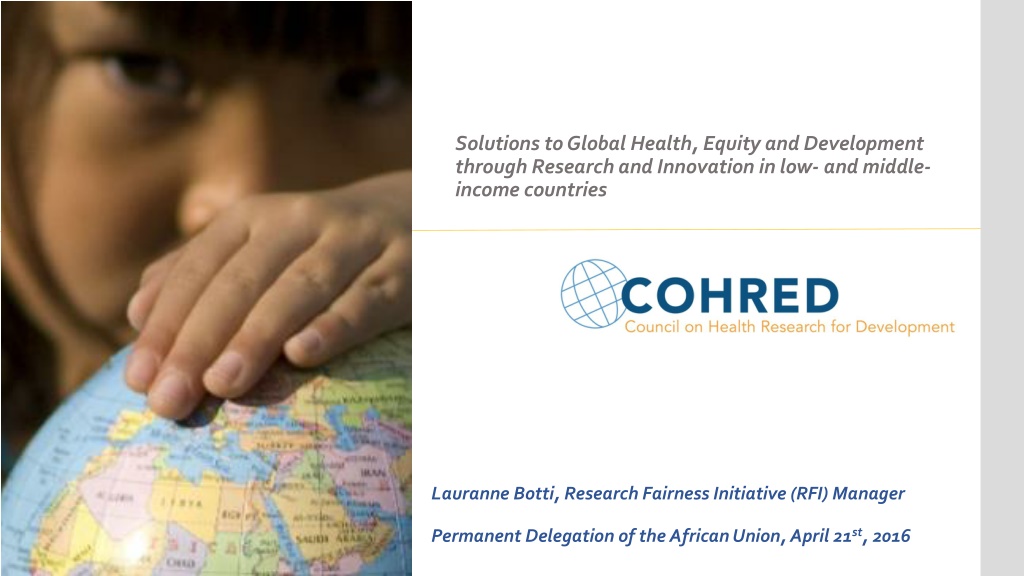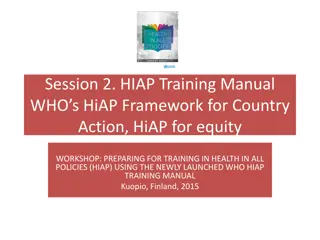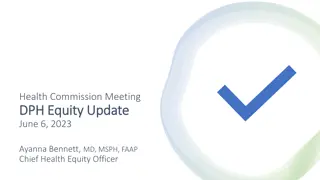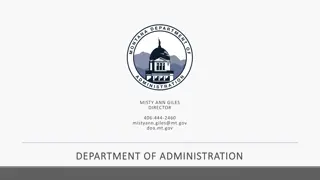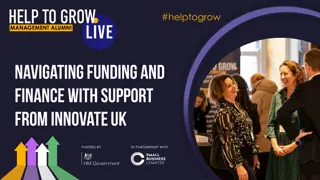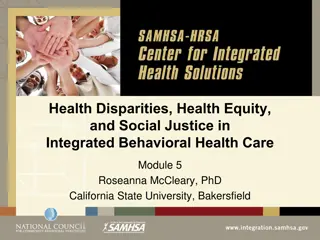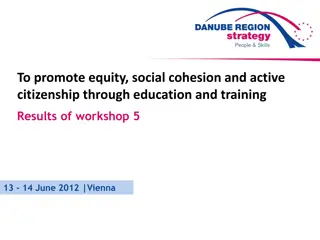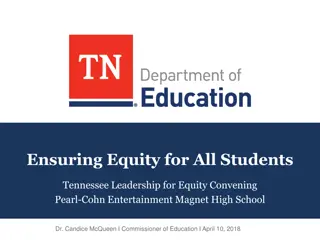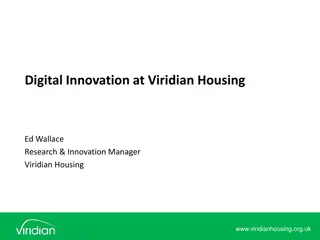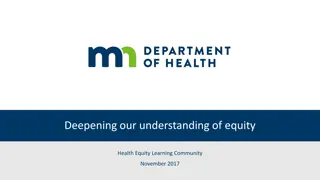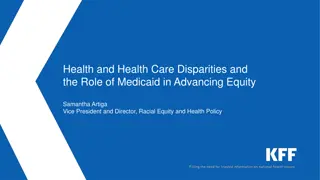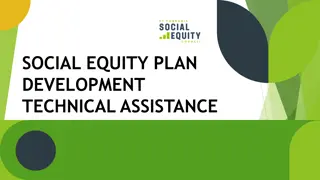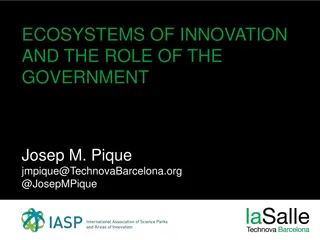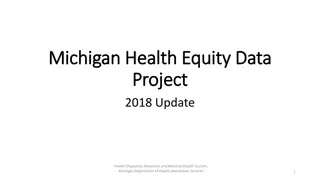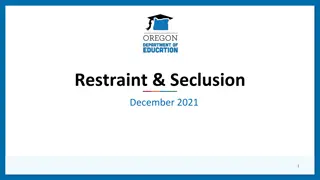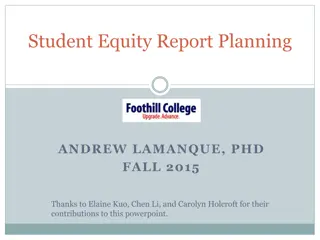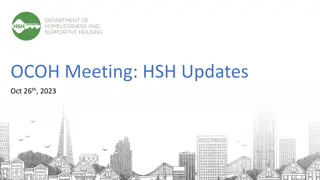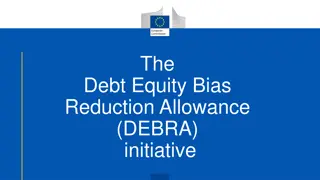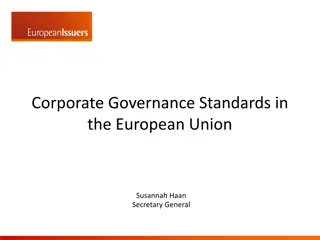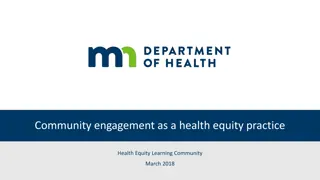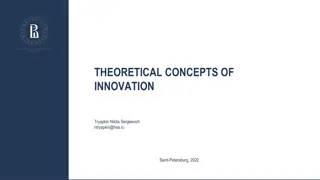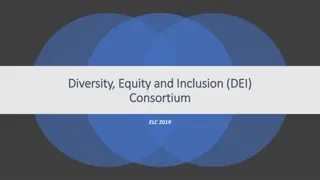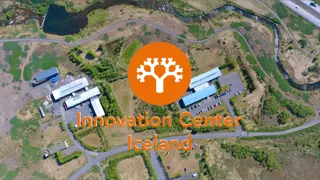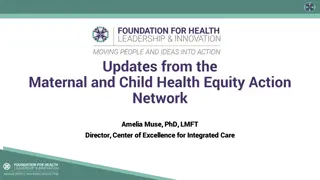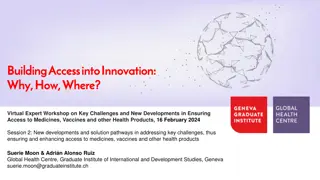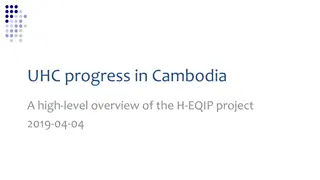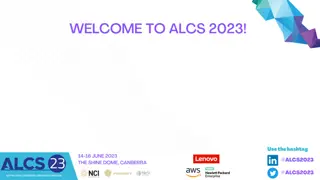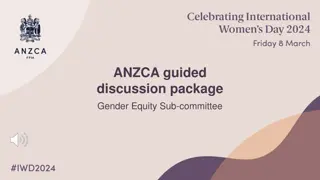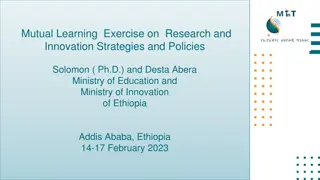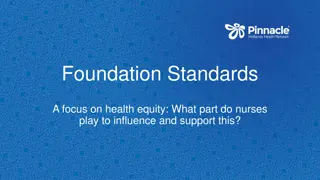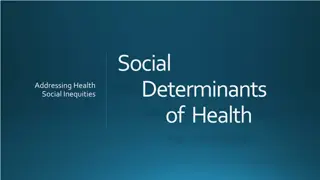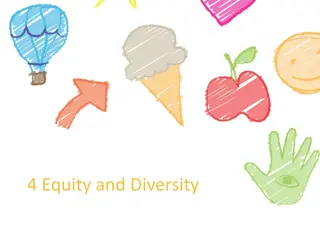Promoting Global Health Equity Through Research and Innovation
This initiative led by the Council on Health Research for Development (COHRED) focuses on accelerating the development of research and innovation systems in low- and middle-income countries to improve health equity and sustainable development. The Research Fairness Initiative (RFI) aims to address unfair practices in research partnerships by encouraging institutional reporting and showcasing effective strategies. By increasing awareness and providing a platform for sharing information, the RFI seeks to enhance collaboration and promote fairness in global health research.
Download Presentation

Please find below an Image/Link to download the presentation.
The content on the website is provided AS IS for your information and personal use only. It may not be sold, licensed, or shared on other websites without obtaining consent from the author. Download presentation by click this link. If you encounter any issues during the download, it is possible that the publisher has removed the file from their server.
E N D
Presentation Transcript
Solutions to Global Health, Equity and Development through Research and Innovation in low- and middle- income countries Lauranne Botti, Research Fairness Initiative (RFI) Manager Permanent Delegation of the African Union, April 21st, 2016
OUR VISION Accelerate the development of research and innovation systems in low-and middle-income countries in ways that promote health of those who need it most. Council on Health Research for Development (COHRED) OUR MISSION Maximise the potential of research and innovation to improve health, equity and sustainable development around the world. We prioritise workthatimpactslow-andmiddle-incomecountries. www.cohred.org www.rfi.cohred.org
Key Design Features of the RFI www.cohred.org www.rfi.cohred.org
Globally, Research Partnerships are created against a complex backdrop of inequitable conditions and practices Addressing unfair outcomesbetween partners in: What problem does the RFI aim to address? Ability toshape the research agenda Scientific productivity andimpact Training andcapacitybuilding opportunities Credit andrecognition for contribution Access todataandintellectual property Compensation for participation in research partnerships www.cohred.org www.rfi.cohred.org
www.cohred.org www.rfi.cohred.org
The RFI aims to provide collective leadership by having institutions reporting on their practices and policies to inform the world through: Making the nature of unfair practices explicit in the RFI How will the RFI address these problems? Encouraging institutional reporting to facilitate improved understanding Showcasing policies, practices and strategies that effectively address problems of fairness Tracking, measuring and reporting on the global state of fairness in research partnerships www.cohred.org www.rfi.cohred.org
THE GLOBAL BENEFITS Increase awareness of existing issues What is the potential value of addressing these problems? Gain sensitivity to how stakeholders view their own actions and practices Provide a legitimate platform for sharing information Improve partnership negotiations Enable analysis of report results Step towards fulfilling SDG 17 www.cohred.org www.rfi.cohred.org
RFI REPORTING GUIDELINES PROPOSED REPORTING QUESTIONS BEFORE Research Fairness of Opportunity 1. Howdoes yourorganisation addressthe researchpriorities of the countryin which researchis being conducted? a. Howdoesitoptimize benefit of researchto the local population? 2. Describe how your organisation matches other partnership contributions / what is your organisation s input to be an equalpartner? 3. Howdoes yourorganisation supportadequate researchcontracting competencein allpartners? 4. How does your organisation coordinate and optimise the decision-making ability of all partners at all stages of the partnership fromconceiving ideastousingresearch results? 5. Howdoes yourorganisation increase the researchcompetitiveness of allpartners? 6. How does your organisation ensure that the language used in collaborations is understandable to all partners linguistically and technically? What are the key features of fair research partnerships? DURING Research Fair Process 7. Howdoes yourorganisation address full cost recovery requirementsof allpartners? 8. Howdoes yourorganisation supportadequate financial management systems in allpartners? 9. Howdoes yourorganisation ensure thatthereisadequate ethics review capacity in allpartnersin thepartnership? 10. What doesyour organisationdotooptimize local sourcing and content? a. What doesyour organisationdotoreducepossiblenegative impact on the local community and systems? 11. Howdoes yourorganisation reducethegapin unequal access to data? 12. What doesyour organisationdotominimise extremes in pay differentials in partnerships? AFTER Research Fair Benefit Sharing 13. What provisions doesyourorganisation havefor fair technology transfer? 14. What provisions doesyourorganisation make forsharing of Intellectual Propertyrights? 15. What policies does your organisation have in place to leave the system and local community better off following research? a. Efforts toincrease researchcapacities forSustainable DevelopmentGoals b. Policyandprocesses set for thedistribution of spin-off economic activities c. Increaseinvolvement of women in researchand innovation 16. How does your organization minimize the environmental impact of its research and innovation activities, particularly in low-andmiddle-incomecountries? 17. Is it a requirement for your partner institutions (both current and potential partners) to adhere to best practice guidelines,suchas theResearch FairnessInitiative? www.cohred.org www.rfi.cohred.org
Scenarios & Specific Reporting Questions www.cohred.org www.rfi.cohred.org
Big Donor HIC University LMIC University What does the RFI try to achieve?: What does the RFI try to achieve?: Scenario 1 Scenario 1 Reports Results Innovation Results Immediate results: Threat of legal action from Big Donor HIC University reputation harmed Long-term results: Restrictive policies are set in place by HIC University The LMIC University still has not had capacity building in finance systems www.cohred.org www.rfi.cohred.org
Big Donor HIC University LMIC University What does the RFI try to achieve?: Scenario 2 Reports Results Innovation Results RFI in place: - Intellectual property rights - Capacity building efforts - Ownership/sharing of data - Compensation for overhead costs - Research contracting context www.cohred.org www.rfi.cohred.org
RFI Technical Working Group Anatole Krattiger, WIPO Andrew Cherry, Association of Commonwealth Universities Charles Mgone, EDCTP Cristiane Quental, Fiocruz Eric Buch, University of Pretoria Francis Kombe, KEMRI/Wellcome Trust Research Programme Garry Aslanyan, TDR/WHO Gerald Keusch , Boston University Glaudina Loots, South Africa Dept. of Science and Technology Glenda Gray, Medical Research Center, South Africa Jack Watters, Pfizer Jackie Olang, Network of African Science Academies Jennifer Dent, BIO Ventures for Global Health Jens Hinricher, London School of Hygiene and Tropical Medicine Jim Kaput, Nestl , Switzerland Jim Lavery, St. Michael s Hospital, Canada John Mugabe, University of Pretoria Kanyawim Kirtikara, BIOTEC, Thailand Kevin Marsh, Oxford University Collaborative Research Programme Konji Sebati, Innovative Pharmaceutical Manufacturers Association, SA Lola Adedokun, Doris Duke Charitable Foundation Mari me Ba, Pharmalys, UK & Senegal Martin Sep lveda, IBM Corporation Merlita Opena, Philippine Council for Health Research and Development Nelmara Arbex, Global Reporting Initiative Nelson Sewankambo, Makerere University, Uganda Orakanoke Phanraksa, National Science & Tech Devpt. Agency, Thailand Pamela Andanda, School of Law, University of the Witwatersrand, SA Prince Bahati, IAVI Renata Curi, Fiocruz Rieke van der Graaf, University Medical Center Utrecht, Netherlands Robert Fraser Terry, TDR/WHO Robert Eiss, Fogarty International Center Sibongile Gumbi, Technology Innovation Agency South Africa Suresh Jadhav , Serum Institute India, India Teodora Padilla, Pharmaceuticals and Health Care Association, Philippines Thomas Bombelles, WIPO Thomas Nyirenda, EDCTP RFI development towards implementation RFI development towards implementation in July 2016 www.cohred.org www.rfi.cohred.org
Email: botti@cohred.org Global health needs research and innovation RFI Website: www.rfi.cohred.org Thank you! The RFI seeks to maximize partnerships for fairness and positive impact on global health. COHRED Website: www.cohred.org Innovation (scalable new interventions that can have global impact) can only work in even larger partnerships The best research is done in partnerships - across sectors, across boundaries
